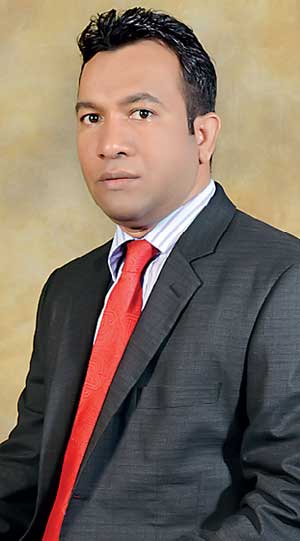Tuesday Feb 17, 2026
Tuesday Feb 17, 2026
Friday, 9 September 2016 16:08 - - {{hitsCtrl.values.hits}}
 T h e Char t e re d Financial Analyst (CFA) Institute is the global association of investment professionals that sets the standard for professional excellence and credentials. The organisation is a champion for ethical behaviour in investment markets and a respected source of knowledge in the global financial community. The end goal is to create an environment where investors’ interests come first, markets function at their best, and economies grow. The Chartered Financial Analyst (CFA) program, a graduate-level program for investment professionals, opens up several opportunities for candidates. The CFA title is the most prestigious and recognised investment analysis and management designation globally and recognised as the gold standard of investment credentials. In an interview with Lasantha Somaratne, CFA, Director, Ministry of Finance, he discussed the benefits of the program and the opportunities it presents. Following are excerpts:
T h e Char t e re d Financial Analyst (CFA) Institute is the global association of investment professionals that sets the standard for professional excellence and credentials. The organisation is a champion for ethical behaviour in investment markets and a respected source of knowledge in the global financial community. The end goal is to create an environment where investors’ interests come first, markets function at their best, and economies grow. The Chartered Financial Analyst (CFA) program, a graduate-level program for investment professionals, opens up several opportunities for candidates. The CFA title is the most prestigious and recognised investment analysis and management designation globally and recognised as the gold standard of investment credentials. In an interview with Lasantha Somaratne, CFA, Director, Ministry of Finance, he discussed the benefits of the program and the opportunities it presents. Following are excerpts:
Q: What is the scope of the CFA program in today’s context?
A: The CFA certification is one of the most sought after professional credentials in finance. If you’re looking for a qualification to enhance your career in finance or establish your finance credentials, this is the recommended qualification for you. The CFA Program ranks on par with some of the top Master of Finance programs in the world, but provides a stronger foundation of advanced investment analysis and real-world portfolio management skills that will give you a career advantage if you are perusing jobs in the fields of investment banking, portfolio management, equity research, etc. The CFA Program curriculum covers a wide area of study that can be used at all stages of your career and provides both professionalism and expertise that is needed. The CFA qualification represents a deep knowledge of the subject and practical skills needed by employers and clients in today’s global investment profession. It is the only program that provides a depth of investment analysis knowledge and globally relevant investment management knowledge skills. Ethics is core to the CFA Program curriculum. The Code of Ethics and Standards of Professional Conduct are the ethical benchmark for investment professionals around the globe. Candidates study the importance of ethical practice in investment management at all levels of the CFA Program.
Q: What kinds of opportunities are available for CFA candidates?
A: The CFA Program provides candidates with relevant, up-to-date knowledge and practical experience and for aspiring individuals wanting to pursue a career in finance; the CFA Program is a good place to start. Many employers recognise the value of the CFA qualification and consider it to be the most respected global investment credential. Therefore many organisations in the financial services sector are committed to employing CFA charter holders due to their high level of professionalism that is coupled with unparalleled expertise, integrity and adaptability.
Q: Do you think the CFA qualification has gained popularity over the years?
A: At present CFA has over 135,000 members in 150 countries/territories. Securing the globally recognised designation can be a significant career boost and as a result we see year on year growth in the number of CFA candidates. At the same time there has also been a growth in the financial services sector. This in turn has opened up a number of opportunities for individuals and holding the internationally respected CFA designation will provide entry into the world’s top notch financial and investment firms.
Q: What attracted you to earn CFA charter?
A: The CFA charter is one of the most recognised professional qualifications in finance in the world. The great thing about global recognition is that the CFA charterholder becomes more easily transferable across markets as it is the exact same qualification that candidates earn all over the world. The program is focused on global best practices driven by real-world experiences. The curriculum design leverages the expertise of thousands of top practitioners and financial experts around the world to develop the practical skills needed in the day-to-day profession. This training is relevant to current developments in investment and financial analysis, assuring both advanced and up-todate skills.